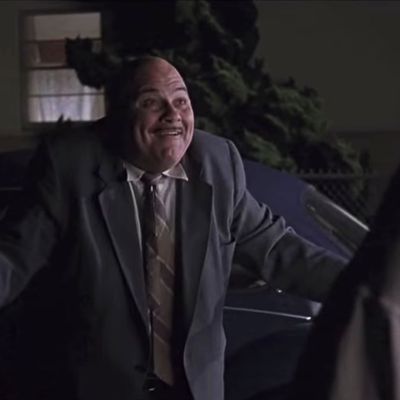
Jon Polito, who died Friday at the age of 65, was a beautiful actor. Often sporting a tobacco-brown tie or a comb-over like crabgrass blowing in the wind, his beauty wasn’t exactly aesthetic (though, you’re going to have to answer to me if you ever say an unkind word about Lou Breeze). But in his warm-blooded embodiment of a certain American archetype, Polito is the kind of actor without whom films like the Coen Brothers’ wouldn’t be possible. To bring to life these worlds — ethnic, gritty, emotional, and loud — you need a performer who can’t be dressed down, a fireworks display of a man. You need a Jon Polito.
Polito has 217 credits to his name, starting with the sort of Italian-gangster entertainment that’s been a cornerstone of American cinema forever. But his most fruitful work came in movies by Joel and Ethan Coen, Jewish-Americans who understand, as well as any other white filmmaker, the importance of identity in fleshing out a vibrant story. The Coens’ catalog is filled with characters who are so fully realized, you can practically guess their biographies — where they grew up, what their parents were like, the influences that raised them. Usually, these details are so well-communicated that it saves the Coens the trouble of having to explain them, allowing their films to launch right into plot and action, exposition already accomplished.
For storytelling like that to work, you need actors who can inhabit and call to life those characters as they’re written. Polito is just one of the many gargantuan performers populating the Coens’ movies, alongside Steve Buscemi, John Goodman, John Turturro, M. Emmet Walsh, Michael Lerner, and Fred Melamed. All of these men have in common the fact that they are immediately impactful, able to make an impression as soon as they appear onscreen — often in supporting roles — and they need neither time nor explanation to be remarkable. They are often unconventional, sweaty, large, balding, oddly dressed, loud, cocky, obnoxious, possibly insane; like furnaces, they radiate heat.
Polito was as good as any of them, with a voice like a saw cutting through dry wood and a deft physicality, disarming for such a big man. To watch a highlight reel of his work is to see an actor constantly on the verge of explosion, an amphibian who could naturally shuffle through tones and emotions.
His best role, as Johnny Caspar in Miller’s Crossing, is among one of the great performances in gangster cinema: Caspar is as unbalanced as he is authoritative, and he, along with J.E. Freeman’s Eddie Dane, Albert Finney’s Leo, and Turturro’s Bernie Bernbaum, gives the film its emotional heft. A mob movie on the surface, Miller’s Crossing is really interested in mercy and forgiveness among men; it’s one of the great songs sung of the ties that bind people to power, and people to people. In Barton Fink, Polito gives a much different performance as the kicked dog Lou Breeze — a virtuoso riff on the abused figures propping up the world’s headiest of honchos. And in The Big Lebowski, Polito’s scene with Jeff Bridges on a dark street at night is a masterwork of comic timing, a major note in the weird symphony that is that film’s misunderstandings and mistakes.
In those three parts, you can see exactly the value of an actor like Polito. With him, a film becomes instantly richer, more evocative, and more idiosyncratic; without him, it loses a very certain type of American beauty. We’ll all be poorer without him.

